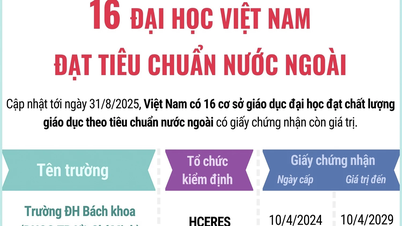Teaching children to "discipline" will make them learn to blame their surroundings and refuse to admit their own mistakes.
Raising honest children
Lying is a common behavior in young children. The ability to lie actually indicates that a child has reached important developmental milestones, such as understanding that others may hold beliefs different from their own and flexibly processing conflicting information in their thinking.
However, Dr. Anh Nguyen, Senior Member of the British Association for Nutrition and Lifestyle Medicine; Clinical Researcher and Project Leader of the "First 1000 Days Program" for Asian Children, said lying can lead to dishonest and fraudulent behavior in adulthood if parents do not know how to respond properly.
“Honesty is the foundation for trust and healthy, meaningful relationships. Furthermore, when children learn to complete tasks honestly, they will feel more confident and competent, without having to rely on cheating or doing things in a haphazard manner,” said Dr. Anh Nguyen.

How to teach children to be honest?
Avoid blaming or punishing.
Young children, especially children under 4 years old, cannot distinguish between truth and falsehood, and their brains are not analytical enough to predict whether something is true or false. Therefore, children learn to lie completely from situations with their parents and caregivers or other situations they encounter, hear, or see.
Doctor Anh Nguyen advises that to limit this behavior, parents should not create an unreal situation or virtual character in front of the child just to get the child's attention, this causes the child to learn to lie unconsciously.
For example, parents or grandparents often joke like: "Mom Tien made the baby cry, right?", "This chair made Bin fall, hit the chair" when they want to get the baby's attention or coax the baby to eat or stop crying, but in reality, none of these words are true.
“This is completely wrong, because this is the way parents unintentionally make their children learn to lie unconsciously, affecting the normal brain development of the child” – Dr. Anh Nguyen said.
Calmly let your child know “I know everything” when dealing with lying behavior.
When seeing children lie, most parents feel upset, angry, scold, even hit the child. However, this does not have an effective educational meaning, even makes the child develop better avoidance and lying behavior early.
What you need to do when your child lies is to let them know that "Mom knows everything, it's not funny" instead of focusing on scolding them. Because in fact, scolding or overreacting from you also gives your child a positive signal that Mom is happy.
Dr. Anh Nguyen gives an example of a situation where a child lies to you like "I drank all the milk" and you know you immediately tell the child "that's not true, I found your milk carton in the fridge". And the child says "I was just teasing you", you immediately tell the child "I don't think that's funny" and you don't need to argue further or scold them for lying, just keep doing what you're doing.
Children at this age only learn to repeat a behavior they have heard/seen/understood, however it will be easily negated if parents stay calm and show the child that "mom knows everything the child says". This is more important and effective than scolding.

Don't praise empty praise, praise effort.
Children are always eager to maintain a good self-image. Research shows that when parents praise their intelligence or tell their children that they are popular because they are “smart,” children are more likely to cheat to protect that reputation. Children may worry that if they don’t succeed, they will be judged negatively and feel less intelligent than their peers.
An interesting experiment conducted by Canadian scientists in which children played a word guessing game divided them into three groups.
The first group was praised for their ability (“You’re so smart”), the second group was praised for their effort (“You did a great job this time”), and the third group received no praise at all. The results showed that children who were praised for being “smart” were more likely to cheat than children who were praised for their performance or who were not praised. This underscores how praising intelligence can create pressure for children to protect their reputations rather than to be honest.
Dr. Anh Nguyen emphasized: “Praising children’s work processes such as effort, perseverance, or problem-solving can reduce cheating behavior. When praised for the process, children will try to maintain the title of hard-working and effective people. This not only promotes honesty but also helps children build a more positive attitude towards learning and development.
Remember, proper praise not only nurtures talent but also builds honesty and perseverance in children.”
Source: https://giadinhonline.vn/sai-lam-khi-day-con-som-muon-cung-bien-tre-thanh-ke-noi-doi-d205009.html


![[Photo] General Secretary To Lam receives US Ambassador to Vietnam Marc Knapper](https://vphoto.vietnam.vn/thumb/1200x675/vietnam/resource/IMAGE/2025/9/29/c8fd0761aa184da7814aee57d87c49b3)
![[Photo] Many streets in Hanoi were flooded due to the effects of storm Bualoi](https://vphoto.vietnam.vn/thumb/1200x675/vietnam/resource/IMAGE/2025/9/29/18b658aa0fa2495c927ade4bbe0096df)
![[Photo] General Secretary To Lam chairs the meeting of the Central Steering Committee on preventing and combating corruption, waste and negativity](https://vphoto.vietnam.vn/thumb/1200x675/vietnam/resource/IMAGE/2025/9/29/fb2a8712315d4213a16322588c57b975)
![[Photo] General Secretary To Lam attends the ceremony to celebrate the 80th anniversary of the post and telecommunications sector and the 66th anniversary of the science and technology sector.](https://vphoto.vietnam.vn/thumb/1200x675/vietnam/resource/IMAGE/2025/9/29/8e86b39b8fe44121a2b14a031f4cef46)
![[Photo] National Assembly Chairman Tran Thanh Man chairs the 8th Conference of full-time National Assembly deputies](https://vphoto.vietnam.vn/thumb/1200x675/vietnam/resource/IMAGE/2025/9/29/2c21459bc38d44ffaacd679ab9a0477c)

























































































Comment (0)